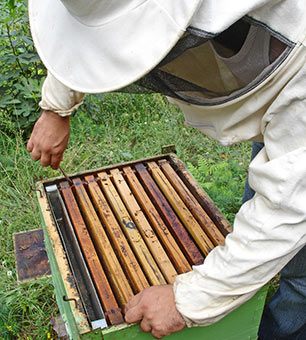Worldwide bee population decline has motivated recent action by governments and activists. On April 29, the European Union announced a two-year suspension of three neonicotinoid insecticides, or “neonics,” that pose “high acute risk” to bees. The ban was demanded in a large campaign by Greenpeace, Friends of the Earth, and other environmental groups, along with more than 2.5 million people who signed a petition in support. On July 16, the EU added fipronil, another pesticide linked to bee kills, to the list of restricted chemicals.
In the United States, the Department of Agriculture and the Environmental Protection Agency released a report in May on honeybee health, the result of collaboration among officials, researchers, beekeepers, and food producers. According to entomologist and beekeeper Dennis vanEngelsdorp, the report is more comprehensive than previous versions and recommends a shift from reactive to proactive policy.
Ongoing scientific research identifies various causes behind the decline of bees, so the problem will require a variety of solutions, says vanEngelsdorp. Knowing the effects of chemicals on bees is complicated, he says, because multiple chemicals interact in the hive and “one plus one doesn’t always equal two.”
VanEngelsdorp says individuals can do a lot to help. Growing flowering plants instead of grass is one easy step. Limiting pesticide use is another. “The people who use the most pesticides per acre are people who live in the city and backyard gardeners,” said vanEngelsdorp. The province of Ontario has recently banned some pesticides. Oregon temporarily banned dinotefuran, a neonic, after 50,000 bumblebees died when ornamental trees were sprayed with the chemical. And corporate accountability group SumofUs is raising funds to send beekeepers to a conference for garden-store owners. They’ll ask the store owners not to stock pesticides that kill bees.
Other bee protectors are using the legal system. Four beekeepers, along with the Center for Food Safety, Beyond Pesticides, Pesticide Action Network, the Sierra Club, and the Center for Environmental Health, filed a lawsuit on March 21.
They’re charging the EPA with failing to protect honeybees from clothianidin and thiamethoxam, two of the neonics included in the EU ban. “America’s beekeepers cannot survive for long with the toxic environment EPA has supported,” said Steve Ellis, one of the beekeepers bringing the lawsuit. “It’s time for the EPA to recognize the value of bees to our food system and agricultural economy.”
Our most important fundraising appeal of the year
December is the most critical time of year for Truthout, because our nonprofit news is funded almost entirely by individual donations from readers like you. So before you navigate away, we ask that you take just a second to support Truthout with a tax-deductible donation.
This year is a little different. We are up against a far-reaching, wide-scale attack on press freedom coming from the Trump administration. 2025 was a year of frightening censorship, news industry corporate consolidation, and worsening financial conditions for progressive nonprofits across the board.
We can only resist Trump’s agenda by cultivating a strong base of support. The right-wing mediasphere is funded comfortably by billionaire owners and venture capitalist philanthropists. At Truthout, we have you.
We’ve set an ambitious target for our year-end campaign — a goal of $211,000 to keep up our fight against authoritarianism in 2026. Please take a meaningful action in this fight: make a one-time or monthly donation to Truthout before December 31. If you have the means, please dig deep.
